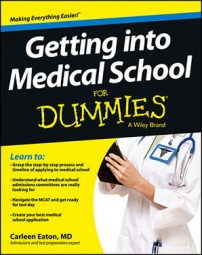Whether you are submitting premedical committee or individual letters of recommendation with your medical school application, the letters of evaluation you solicit from professors, physicians, and so on need to show that these folks have a strong grasp on you and your strengths.
Your recommenders need to be people you’ve cultivated a strong relationship with over time. By the time you actually need the letters, it’s far too late to develop a strong relationship with your endorser. A letter from a professor who barely remembers you or didn’t know you well in the first place is going to be a mediocre one at best.
To obtain strong letters, get to know your professors, physicians you shadow, and other potential evaluators as you make your way through your classes and outside activities instead of, say, rushing to visit office hours for the first time a couple of weeks before hitting up your professor for a letter.
With a diverse group of recommenders to select from, you can choose those who fulfill the requirements for the schools on your list. After you choose whom to ask, you need to approach your potential evaluators in a way (and on a timeline) that’s most likely to yield you a strong letter, providing the writer with the materials she needs to do the job well.
You also need to be prepared to take action if a potential evaluator isn’t enthusiastic about writing a letter.
How to get great medical school letters of recommendation
A superb letter can only be written by someone who knows you well and can provide specific details and examples about your achievements, performance, and personal qualities. Here’s a sample recommendation; judge how well it meets the criteria:
“Erica received an A in the physiology class I teach. This course is very rigorous, and this grade is evidence that she has the intellect needed to succeed in medical school. She also attended office hours on two occasions. Based on these interactions with her and on her performance as a student in my course, I believe she will make a good medical student.”
Unconvincing? Weak? Ineffective? This letter is all these things and more. Even with an added paragraph introducing Erica and incorporating some tidbits from her resume and a conclusion saying a few more nice things about her, this letter seems to be from someone who barely knows her.
The reader is left questioning Erica’s judgment in selecting evaluators; is this really the best she could do? If so, the committee has reason to be concerned.
To avoid this situation, make an active effort from the start of your premedical years to build relationships with the professors teaching your courses, physicians you shadow, and others who supervise you in some capacity.
The best way for this camaraderie to happen is organically; the more active you are in class participation, volunteering, shadowing, and research, the greater the opportunities for potential evaluators to see your work directly and learn about your motivation, skills, and personal qualities.
Best ways to get to know your premed professors
If you attend a university that relies mostly on large lecture classes, getting to know your professors can be extremely challenging. Here are some strategies for forging a relationship with faculty:
Participate in class discussions. If sitting in the back of the class and passively listening is your style, you may have a hard time making yourself known to the professor.
You don’t need to transform yourself into the type that sits in the front row and chimes in every few minutes with a question or comment, but offering to answer a question, participating in discussion sections, and generally taking an active part in the class is the first step in getting to know your instructor.
Attend office hours. Office hours provide an opportunity to meet with the professor one-on-one or as part of a small group. Use this time to ask questions or discuss material in greater depth with the course instructor.
Do research with a professor at your school. If you have an interest in research, working in a lab or doing clinical research on campus allows for much greater interaction with faculty than a classroom setting does.
Become a teaching assistant. Some colleges utilize undergraduate teaching assistants who work closely with the course instructor to perform tasks such as running discussion, review, or laboratory sections; proctoring exams; and grading tests and assignments.
Enroll in a subsequent course taught by the same professor. If you enjoyed a course taught by a particular professor, consider signing up for a second class with that same instructor. A professor who has interacted with you over a longer period of time will have a better chance to know you and can more effectively reflect on your development.
Select smaller, discussion-based courses if you can. Upper-level, more specialized courses in particular may offer the opportunity for you to be part of a smaller class.
Best ways to make a good impression on other evaluators
In addition to faculty letters, letters from physicians with whom you’ve shadowed, from advisors of clubs or other organizations you’re active in, or from supervisors at a your place of employment are also valuable. By picking a few long-term activities to focus on, you really get to know the individuals you work with, and (even more importantly) they get to know you.
When shadowing a physician, for example, don’t just passively observe; ask questions between patients and offer to assist in any way possible. Even someone who participates in an activity for years won’t get a great letter of recommendation if she appears bored, lacks initiative, or is clearly just putting in her time so that she can list an experience on her application.

